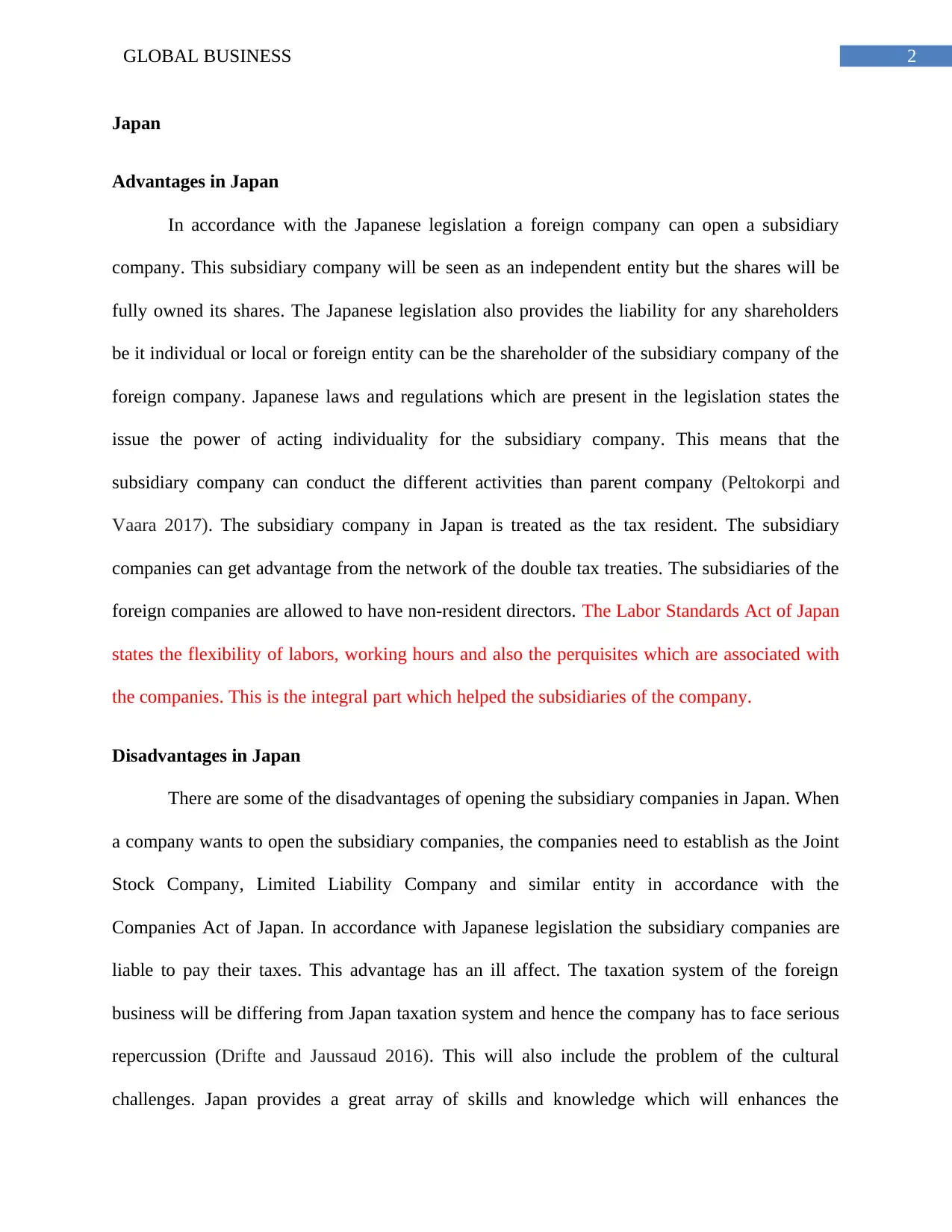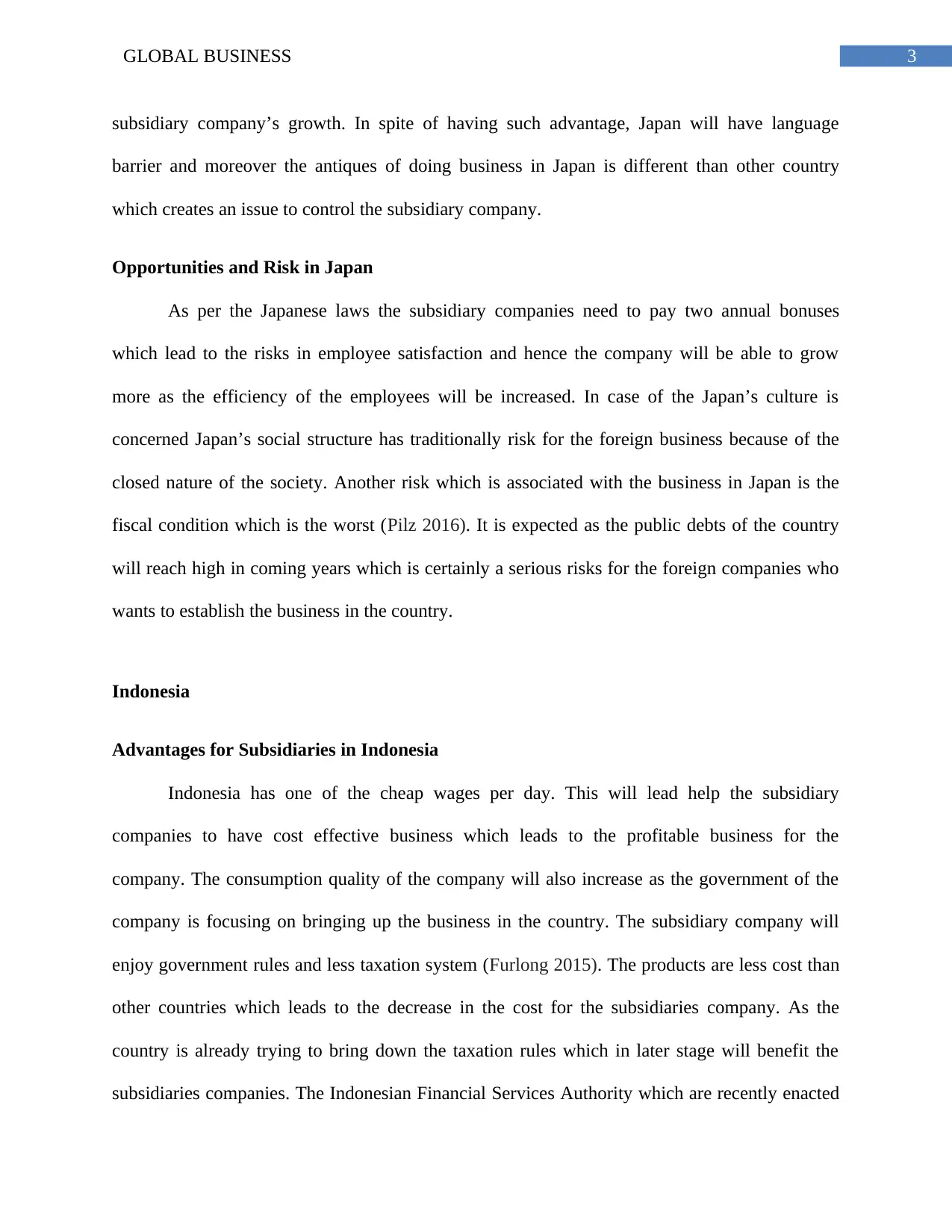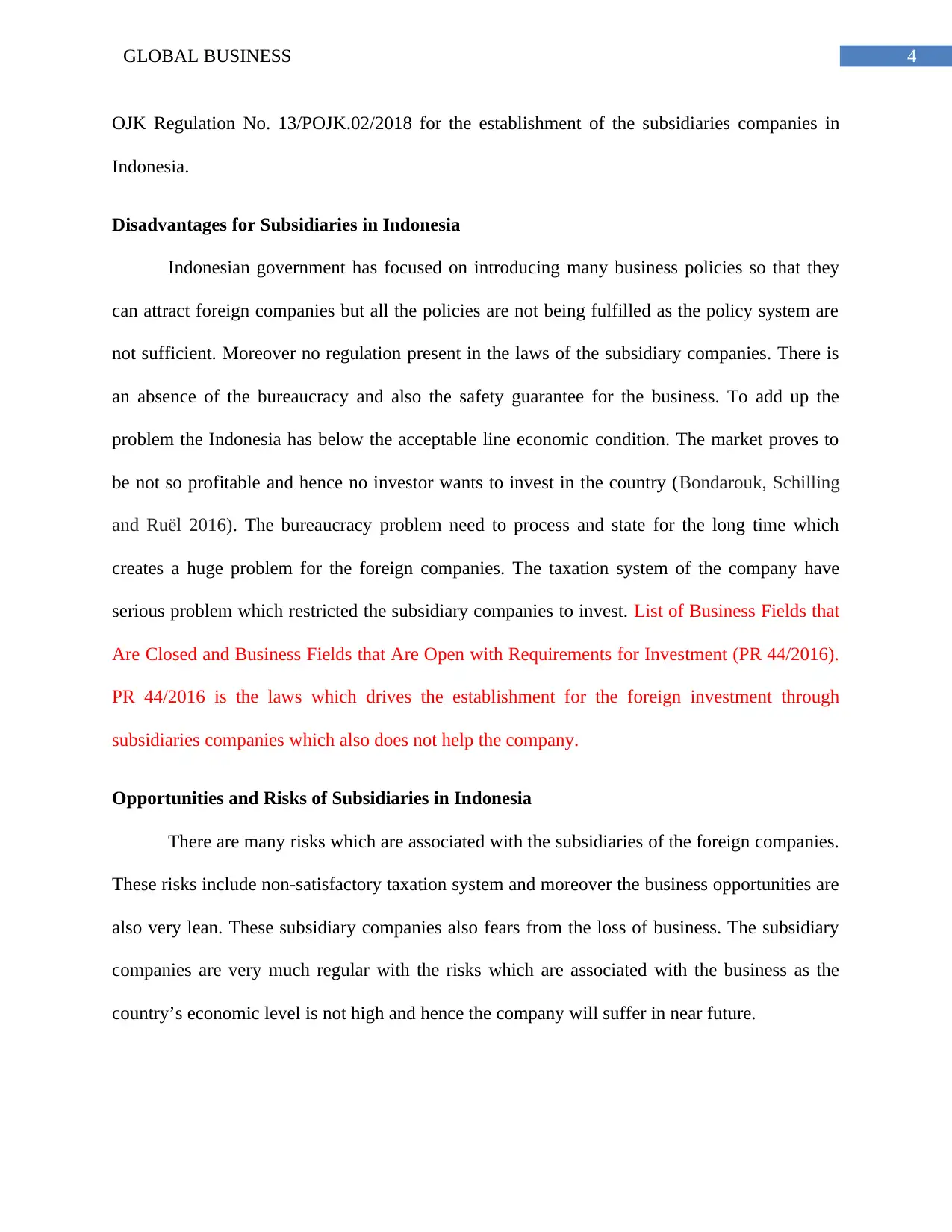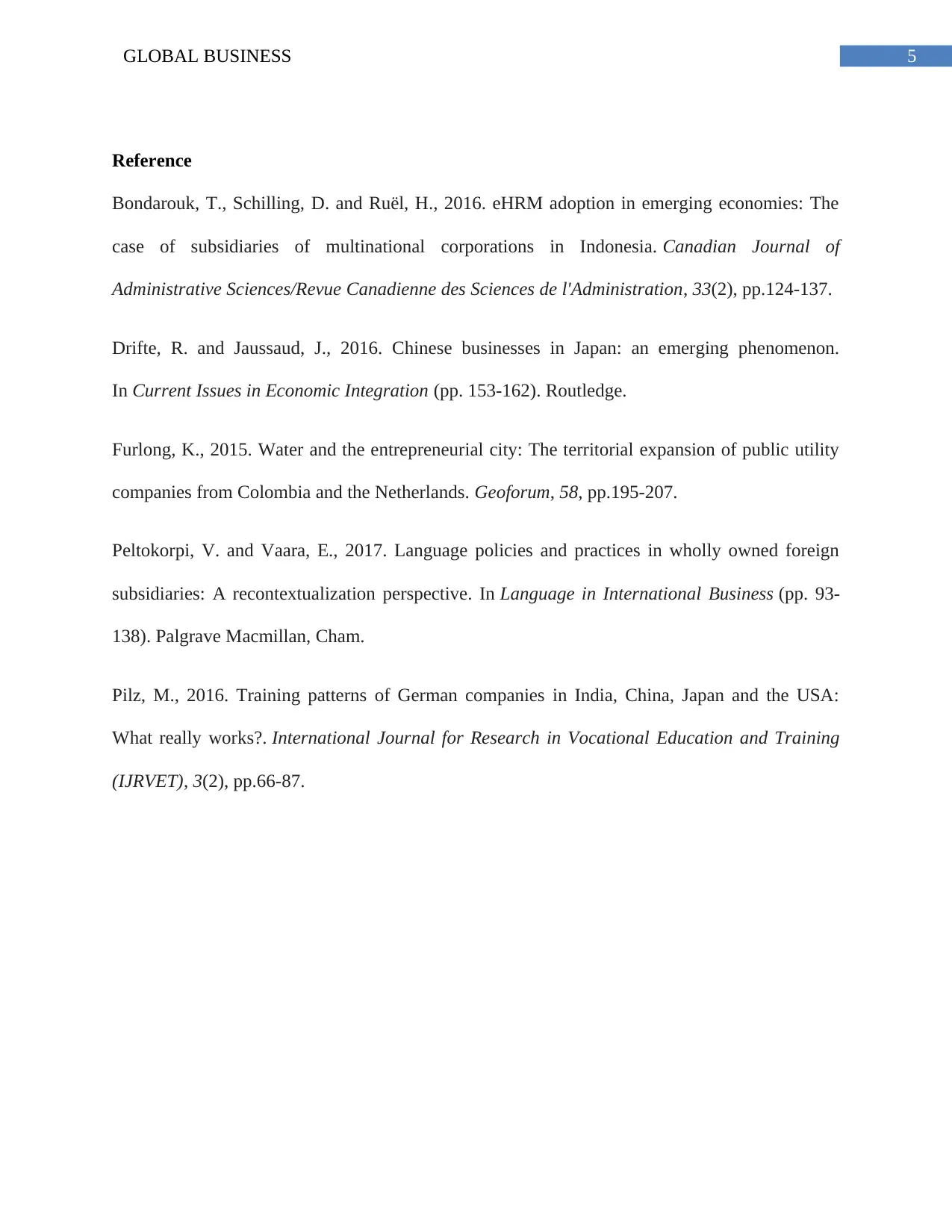Global Business Report: Subsidiaries in Japan and Indonesia
VerifiedAdded on 2022/09/27
|6
|1148
|24
Report
AI Summary
This report provides a comprehensive analysis of global business operations, specifically focusing on the establishment and performance of subsidiary companies in Japan and Indonesia. The report begins by examining the advantages and disadvantages of establishing a subsidiary in Japan, considering factors such as legal frameworks, taxation, cultural challenges, and labor standards. It then explores the opportunities and risks associated with doing business in Japan, including aspects such as bonuses and the country's social structure and fiscal conditions. The report then shifts its focus to Indonesia, detailing the advantages, such as cheap wages and government incentives, and disadvantages, including policy shortcomings and economic conditions. It also examines the opportunities and risks for subsidiary companies in Indonesia, including taxation and the country's economic state. The report concludes with a discussion of the relevant laws and regulations governing foreign investment through subsidiary companies, providing a detailed overview of the business environment in both countries.

Running head: GLOBAL BUSINESS
GLOBAL BUSINESS
Name of Student
Name of University
Author’s Note
GLOBAL BUSINESS
Name of Student
Name of University
Author’s Note
Paraphrase This Document
Need a fresh take? Get an instant paraphrase of this document with our AI Paraphraser

1GLOBAL BUSINESS
Table of Content
Table of Content

2GLOBAL BUSINESS
Japan
Advantages in Japan
In accordance with the Japanese legislation a foreign company can open a subsidiary
company. This subsidiary company will be seen as an independent entity but the shares will be
fully owned its shares. The Japanese legislation also provides the liability for any shareholders
be it individual or local or foreign entity can be the shareholder of the subsidiary company of the
foreign company. Japanese laws and regulations which are present in the legislation states the
issue the power of acting individuality for the subsidiary company. This means that the
subsidiary company can conduct the different activities than parent company (Peltokorpi and
Vaara 2017). The subsidiary company in Japan is treated as the tax resident. The subsidiary
companies can get advantage from the network of the double tax treaties. The subsidiaries of the
foreign companies are allowed to have non-resident directors. The Labor Standards Act of Japan
states the flexibility of labors, working hours and also the perquisites which are associated with
the companies. This is the integral part which helped the subsidiaries of the company.
Disadvantages in Japan
There are some of the disadvantages of opening the subsidiary companies in Japan. When
a company wants to open the subsidiary companies, the companies need to establish as the Joint
Stock Company, Limited Liability Company and similar entity in accordance with the
Companies Act of Japan. In accordance with Japanese legislation the subsidiary companies are
liable to pay their taxes. This advantage has an ill affect. The taxation system of the foreign
business will be differing from Japan taxation system and hence the company has to face serious
repercussion (Drifte and Jaussaud 2016). This will also include the problem of the cultural
challenges. Japan provides a great array of skills and knowledge which will enhances the
Japan
Advantages in Japan
In accordance with the Japanese legislation a foreign company can open a subsidiary
company. This subsidiary company will be seen as an independent entity but the shares will be
fully owned its shares. The Japanese legislation also provides the liability for any shareholders
be it individual or local or foreign entity can be the shareholder of the subsidiary company of the
foreign company. Japanese laws and regulations which are present in the legislation states the
issue the power of acting individuality for the subsidiary company. This means that the
subsidiary company can conduct the different activities than parent company (Peltokorpi and
Vaara 2017). The subsidiary company in Japan is treated as the tax resident. The subsidiary
companies can get advantage from the network of the double tax treaties. The subsidiaries of the
foreign companies are allowed to have non-resident directors. The Labor Standards Act of Japan
states the flexibility of labors, working hours and also the perquisites which are associated with
the companies. This is the integral part which helped the subsidiaries of the company.
Disadvantages in Japan
There are some of the disadvantages of opening the subsidiary companies in Japan. When
a company wants to open the subsidiary companies, the companies need to establish as the Joint
Stock Company, Limited Liability Company and similar entity in accordance with the
Companies Act of Japan. In accordance with Japanese legislation the subsidiary companies are
liable to pay their taxes. This advantage has an ill affect. The taxation system of the foreign
business will be differing from Japan taxation system and hence the company has to face serious
repercussion (Drifte and Jaussaud 2016). This will also include the problem of the cultural
challenges. Japan provides a great array of skills and knowledge which will enhances the
⊘ This is a preview!⊘
Do you want full access?
Subscribe today to unlock all pages.

Trusted by 1+ million students worldwide

3GLOBAL BUSINESS
subsidiary company’s growth. In spite of having such advantage, Japan will have language
barrier and moreover the antiques of doing business in Japan is different than other country
which creates an issue to control the subsidiary company.
Opportunities and Risk in Japan
As per the Japanese laws the subsidiary companies need to pay two annual bonuses
which lead to the risks in employee satisfaction and hence the company will be able to grow
more as the efficiency of the employees will be increased. In case of the Japan’s culture is
concerned Japan’s social structure has traditionally risk for the foreign business because of the
closed nature of the society. Another risk which is associated with the business in Japan is the
fiscal condition which is the worst (Pilz 2016). It is expected as the public debts of the country
will reach high in coming years which is certainly a serious risks for the foreign companies who
wants to establish the business in the country.
Indonesia
Advantages for Subsidiaries in Indonesia
Indonesia has one of the cheap wages per day. This will lead help the subsidiary
companies to have cost effective business which leads to the profitable business for the
company. The consumption quality of the company will also increase as the government of the
company is focusing on bringing up the business in the country. The subsidiary company will
enjoy government rules and less taxation system (Furlong 2015). The products are less cost than
other countries which leads to the decrease in the cost for the subsidiaries company. As the
country is already trying to bring down the taxation rules which in later stage will benefit the
subsidiaries companies. The Indonesian Financial Services Authority which are recently enacted
subsidiary company’s growth. In spite of having such advantage, Japan will have language
barrier and moreover the antiques of doing business in Japan is different than other country
which creates an issue to control the subsidiary company.
Opportunities and Risk in Japan
As per the Japanese laws the subsidiary companies need to pay two annual bonuses
which lead to the risks in employee satisfaction and hence the company will be able to grow
more as the efficiency of the employees will be increased. In case of the Japan’s culture is
concerned Japan’s social structure has traditionally risk for the foreign business because of the
closed nature of the society. Another risk which is associated with the business in Japan is the
fiscal condition which is the worst (Pilz 2016). It is expected as the public debts of the country
will reach high in coming years which is certainly a serious risks for the foreign companies who
wants to establish the business in the country.
Indonesia
Advantages for Subsidiaries in Indonesia
Indonesia has one of the cheap wages per day. This will lead help the subsidiary
companies to have cost effective business which leads to the profitable business for the
company. The consumption quality of the company will also increase as the government of the
company is focusing on bringing up the business in the country. The subsidiary company will
enjoy government rules and less taxation system (Furlong 2015). The products are less cost than
other countries which leads to the decrease in the cost for the subsidiaries company. As the
country is already trying to bring down the taxation rules which in later stage will benefit the
subsidiaries companies. The Indonesian Financial Services Authority which are recently enacted
Paraphrase This Document
Need a fresh take? Get an instant paraphrase of this document with our AI Paraphraser

4GLOBAL BUSINESS
OJK Regulation No. 13/POJK.02/2018 for the establishment of the subsidiaries companies in
Indonesia.
Disadvantages for Subsidiaries in Indonesia
Indonesian government has focused on introducing many business policies so that they
can attract foreign companies but all the policies are not being fulfilled as the policy system are
not sufficient. Moreover no regulation present in the laws of the subsidiary companies. There is
an absence of the bureaucracy and also the safety guarantee for the business. To add up the
problem the Indonesia has below the acceptable line economic condition. The market proves to
be not so profitable and hence no investor wants to invest in the country (Bondarouk, Schilling
and Ruël 2016). The bureaucracy problem need to process and state for the long time which
creates a huge problem for the foreign companies. The taxation system of the company have
serious problem which restricted the subsidiary companies to invest. List of Business Fields that
Are Closed and Business Fields that Are Open with Requirements for Investment (PR 44/2016).
PR 44/2016 is the laws which drives the establishment for the foreign investment through
subsidiaries companies which also does not help the company.
Opportunities and Risks of Subsidiaries in Indonesia
There are many risks which are associated with the subsidiaries of the foreign companies.
These risks include non-satisfactory taxation system and moreover the business opportunities are
also very lean. These subsidiary companies also fears from the loss of business. The subsidiary
companies are very much regular with the risks which are associated with the business as the
country’s economic level is not high and hence the company will suffer in near future.
OJK Regulation No. 13/POJK.02/2018 for the establishment of the subsidiaries companies in
Indonesia.
Disadvantages for Subsidiaries in Indonesia
Indonesian government has focused on introducing many business policies so that they
can attract foreign companies but all the policies are not being fulfilled as the policy system are
not sufficient. Moreover no regulation present in the laws of the subsidiary companies. There is
an absence of the bureaucracy and also the safety guarantee for the business. To add up the
problem the Indonesia has below the acceptable line economic condition. The market proves to
be not so profitable and hence no investor wants to invest in the country (Bondarouk, Schilling
and Ruël 2016). The bureaucracy problem need to process and state for the long time which
creates a huge problem for the foreign companies. The taxation system of the company have
serious problem which restricted the subsidiary companies to invest. List of Business Fields that
Are Closed and Business Fields that Are Open with Requirements for Investment (PR 44/2016).
PR 44/2016 is the laws which drives the establishment for the foreign investment through
subsidiaries companies which also does not help the company.
Opportunities and Risks of Subsidiaries in Indonesia
There are many risks which are associated with the subsidiaries of the foreign companies.
These risks include non-satisfactory taxation system and moreover the business opportunities are
also very lean. These subsidiary companies also fears from the loss of business. The subsidiary
companies are very much regular with the risks which are associated with the business as the
country’s economic level is not high and hence the company will suffer in near future.

5GLOBAL BUSINESS
Reference
Bondarouk, T., Schilling, D. and Ruël, H., 2016. eHRM adoption in emerging economies: The
case of subsidiaries of multinational corporations in Indonesia. Canadian Journal of
Administrative Sciences/Revue Canadienne des Sciences de l'Administration, 33(2), pp.124-137.
Drifte, R. and Jaussaud, J., 2016. Chinese businesses in Japan: an emerging phenomenon.
In Current Issues in Economic Integration (pp. 153-162). Routledge.
Furlong, K., 2015. Water and the entrepreneurial city: The territorial expansion of public utility
companies from Colombia and the Netherlands. Geoforum, 58, pp.195-207.
Peltokorpi, V. and Vaara, E., 2017. Language policies and practices in wholly owned foreign
subsidiaries: A recontextualization perspective. In Language in International Business (pp. 93-
138). Palgrave Macmillan, Cham.
Pilz, M., 2016. Training patterns of German companies in India, China, Japan and the USA:
What really works?. International Journal for Research in Vocational Education and Training
(IJRVET), 3(2), pp.66-87.
Reference
Bondarouk, T., Schilling, D. and Ruël, H., 2016. eHRM adoption in emerging economies: The
case of subsidiaries of multinational corporations in Indonesia. Canadian Journal of
Administrative Sciences/Revue Canadienne des Sciences de l'Administration, 33(2), pp.124-137.
Drifte, R. and Jaussaud, J., 2016. Chinese businesses in Japan: an emerging phenomenon.
In Current Issues in Economic Integration (pp. 153-162). Routledge.
Furlong, K., 2015. Water and the entrepreneurial city: The territorial expansion of public utility
companies from Colombia and the Netherlands. Geoforum, 58, pp.195-207.
Peltokorpi, V. and Vaara, E., 2017. Language policies and practices in wholly owned foreign
subsidiaries: A recontextualization perspective. In Language in International Business (pp. 93-
138). Palgrave Macmillan, Cham.
Pilz, M., 2016. Training patterns of German companies in India, China, Japan and the USA:
What really works?. International Journal for Research in Vocational Education and Training
(IJRVET), 3(2), pp.66-87.
⊘ This is a preview!⊘
Do you want full access?
Subscribe today to unlock all pages.

Trusted by 1+ million students worldwide
1 out of 6
Related Documents
Your All-in-One AI-Powered Toolkit for Academic Success.
+13062052269
info@desklib.com
Available 24*7 on WhatsApp / Email
![[object Object]](/_next/static/media/star-bottom.7253800d.svg)
Unlock your academic potential
Copyright © 2020–2025 A2Z Services. All Rights Reserved. Developed and managed by ZUCOL.





